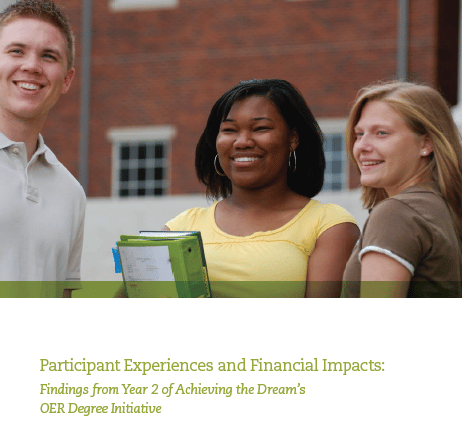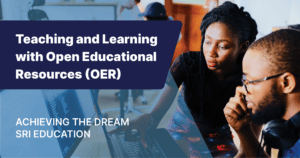In partnership with national experts and dozens of community colleges nationwide, Achieving the Dream is actively exploring how the adoption and implementation of open educational resources (OER) affect equity, access, and the student experience in higher education.
Open educational resources (OER) can increase affordability and access in a college course. When implemented across an institution, OER can lead to improved outcomes for students and deeper engagement from faculty.
ATD’s Grant-funded OER Initiatives
Our past, current, and future initiatives around OER are helping the field better understand how these resources benefit students, advance culturally responsive teaching, and catalyze innovation at institutions of higher education.
OER Degree Initiative
This three-year project studied 38 colleges nationwide to understand the institutional investment in OER.
Jump to initiativeTeaching and Learning with OER
ATD and SRI Education are working with eight colleges to explore how OER programs support open pedagogy and culturally responsive teaching.
Jump to initiativeOpen Education in Tennessee
ATD has partnered with the Tennessee Board of Regents to document how professional learning supports open education in OER courses.
Jump to initiative
“Because OER are customizable, they give educators the flexibility to incorporate voices, examples, and activities that reflect their students’ backgrounds and realities. They also allow students to contribute to educational content, bringing in their own experiences and knowledge.”
For Faculty Focus, Dr. Ruanda Garth-McCullough and Dr. Richard Sebastian wrote about how OER can help colleges adopt and expand culturally relevant teaching practices.
Read the articleOER Degree Initiative (2016–2020)
The Achieving the Dream OER Degree Initiative, a three-year project involving 38 colleges nationwide, demonstrated the benefits of institutional investment in OER: higher rates of completion for students enrolled in OER courses, added potential for innovations in teaching and learning, and an estimated $10.7 million in total instructional cost savings for all students.
The OER Degree Initiative helped scale the adoption and use of OER courses at participating colleges.
An evaluation by SRI Education generated new evidence about the academic, economic, and administrative impacts of this model on students and institutions.
By the Numbers
The OER Degree Initiative demonstrated the academic and economic benefits of open educational resources.
$65
savings per student enrolled in OER courses
+3
average additional credits earned by students enrolled in OER courses
$10M
total student savings across the initiative
Explore the Findings
Teaching and Learning with Open Educational Resources (2020–2022)
Over the past two years, Achieving the Dream and SRI Education have collaborated with eight community colleges with mature OER programs to explore how the adoption of openly licensed materials supports open educational practices and culturally responsive teaching. Funded by the William and Flora Hewlett Foundation, this research project studied how OER initiatives at community colleges transform instruction, how students experience OER, and which institutional policies and practices facilitated, or impeded, innovations in the classroom.
Teaching and Learning with Open Educational Resources is the first report of its kind to look extensively at how instructors are using OER to advance equity in the classroom.
Learn moreOpen Education in Tennessee (2022–2023)
While there is a great interest in understanding how OER can support open educational practices in teaching, there is limited evidence in the field. Community colleges serve large numbers of economically disadvantaged students, so it’s crucial for institutions to understand how OER — and the training, support, and innovation that comes with it — may help faculty redesign their courses with open education as a priority.
ATD is partnering with the Tennessee Board of Regents (TBR) to document how faculty of colleges in the Tennessee Open Education OER Grant program use professional learning to develop teaching practices within OER programs. The project will also examine how faculty use what they’ve learned to redesign their courses and how students experience the OER-enabled classroom. This grant will be undertaken in close partnership with executive staff from the Tennessee Board of Regents and project partners at SRI Education.
Read the report Students’ and Instructors’ Experiences With Open and Culturally Responsive Instruction: Findings From a State OER Program. This study was conducted by SRI Education in partnership with Achieving the Dream (ATD) and explores how open educational practices (OEP) can be incorporated into different components of a course.


